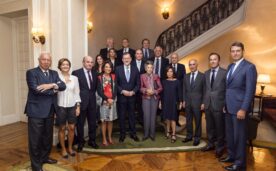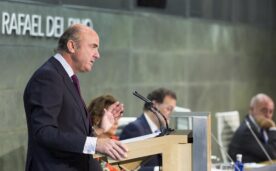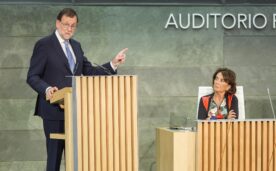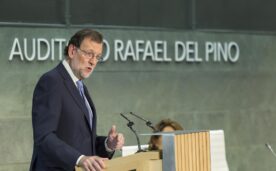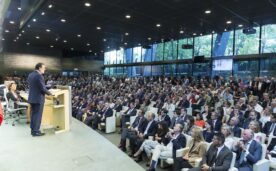On 14 September 2016, the Rafael del Pino Foundation organised the Master Conference "Spain under threat. How we avoided the bailout and the economy regained growth" given by Luis de Guindos on the occasion of his latest book of the same title.
Luis de Guindos is an economist and Minister of Economy and Competitiveness. He belongs to the Cuerpo Superior de Técnicos Comerciales y Economistas del Estado and held different positions during the two Aznar governments (1996-2004). He has worked in financial services companies as a member of the Advisory Board of Lehman Brothers at European level and director in Spain and Portugal until its bankruptcy in 2008.
In 2012, an unprecedented crisis broke out in Spain. It was triggered by a real estate and credit bubble that was aggravated by bad policy decisions and a turbulent international environment. The three crises - financial, fiscal and economic - were unleashed at the same time. Never before had the Spanish economy been so trapped, nor had it suffered such a long and deep recession. In this climate of mistrust - no one would lend to anyone, no one trusted anyone - everything pushed Spain to ask for a bailout from its European partners.
Such a decision would have meant the loss of autonomy in economic policy and that our self-esteem as a country would have been deeply damaged. The government set to work to avoid this. A purpose that did not spare meetings with international partners, internal pressures and critical moments in which the euro project was seriously threatened.
Luis de Guindos was a first-row witness to all this: the first measures to cut the deficit bleeding, the defence of the reforms before European partners and international investors, the Bankia crisis and its consequences, the financial assistance programme and the intense restructuring of the sector carried out... An exciting succession of events of which De Guindos gives an account in this book, an account not only of what was done but above all of how it was done and why.
On 14 September 2016, the Rafael del Pino Foundation organised the master conference "Spain under threat. How we avoided the bailout and the economy returned to growth", with the participation of the Prime Minister, Mariano Rajoy, and the Minister of Economy, Luis de Guindos.
According to Guindos, 2012 was the most complicated year in our recent history, due to the severe economic and financial crisis that ravaged our country and even threatened to break up the euro. However, the rescue of the banking system was the retaining wall that prevented the Spanish economy from having to be rescued as a whole.
In this sense, the most important thing was the strategy followed by the government, as Spain was surrounded by international mistrust and constant attacks from the markets, with the financial sector at the centre of the target. It was therefore very important to expose Spain to the independent analyses of international bodies such as the European Commission and the European Central Bank. Thanks to this, and to the speed and forcefulness with which action was taken, a bailout of our economy was avoided.
Several lessons can be drawn from this difficult experience: it is always necessary to recognise reality with the utmost objectivity, to offer solutions beyond media or political noise, or that a country cannot permanently lose competitiveness or neglect the bubbles because it ends up generating a serious economic crisis.
The economy is now regaining its lost competitiveness, thanks in particular to the labour reform, allowing it to grow at twice the rate of the EU and create half a million jobs per year. However, the end of the crisis still requires a return to pre-crisis levels of income and employment.
The problem now is that the lack of a fully functioning government limits Spain's capacity to face challenges as important as the weakness of growth in the EU, Brexit, the refugee crisis and the rise of populism. In Guindos' opinion, if we do not emerge from this interim situation, the situation will become very similar to that of 2012, because the worst crises are those generated by politics.
For his part, Mariano Rajoy recalled that Spain did not receive much aid or widespread understanding inside and outside the country, despite the catastrophic situation in 2012. At that time there seemed to be only two options: bailout or exit from the euro. The government, however, opted for a third, structural reforms.
If these policies continue, he said, Spain can grow at high rates in the coming years and create half a million jobs a year. But things could change if there is no government that moves forward with structural reforms, or if what we have is an executive that seeks to reverse these policies.
